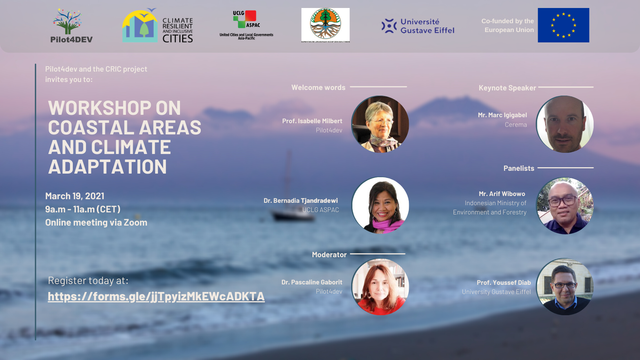
On the 19th of March 2021, Climate Resilient and Inclusive Cities held a workshop on coastal capacity building to support climate resilient solutions to disaster. The event, organised by Pilot4Dev with the support of UCLG ASPAC, presented solutions from European, Indonesian and Indian experts to help local governments in coastal cities anticipate the impact of climate change. The event, which gathered more than 80 individual participants including speakers and panelists, was a great success and generated quite a lot of interest from participating cities.
The Indonesian context
Low-lying coastal areas are vulnerable to disasters such as the sea levels, hurricanes, strong winds, and flash floods. Many coastal regions, like those in Indonesia and the Caribbean, are below sea level. The vulnerability is exacerbated by rapid population development, which is exacerbated by soil subsidence, saline intrusion, and water scarcity. To avoid disasters, immediate action is needed to address the effects of climate change in these coastal areas.
Furthermore, climate change has a negative effect on vulnerable coastal and marine ecosystems, as well as the role and composition of their habitats. Rising sea levels alter the structure of coastlines, contribute to coastal erosion, and result in flooding and the infiltration of more saltwater.
Physical infrastructure, Early Warning solutions, Nature Based Solutions, and Preparedness can all be part of the solution for integrated coastal protection. These are essential steps in laying the foundation for long-term coastal protection that safeguards both local communities and the human and natural environment. Integrated coastal defense is a well-known tool for addressing both immediate and long-term coastal problems, such as climate change and its consequences. The panel's aim was to talk about how well integrated coastal defense is meeting nowadays’ needs and those of the future.
Knowledge exchange
The event allowed Marc Igigabel, from Cerema, the Centre for Studies and Expertise on Risks, the Environment, Mobility and Urban planning to discuss the fundamentals behind coastal protection, climate change and how those challenges and hazards can be approached to better adapt coastlines.
Arif Wibowo, the Indonesia Ministry of Environment and Forestry’s Deputy Director for Vulnerability Identification and Assessment underlined the importance of national guidelines in place and the provision of technical guidelines through capacity building and tools. Mr Arif Wibowo shared an Indonesian context of climate adaptation stressing the need for translating high-level commitment into policies, incentive mechanism to enhance climate action at a community level and promote climate literacy. Several projects are already in place at the local level. He also welcomed the insights presented during the keynote and underlined the crucial role that early warning systems and climate mitigation will have regarding coastal protection. He was joined in this discussion by University of Gustave Eiffel’s Professor Youssef Diab who contextualized the issues in several international settings such as New Orleans and indicated how the approach can be adapted to the Indonesian coastlines.
Local involvement
Attendees such as Mr Alfan Alfian from the Environmental Agency of Kendari & Mr M. Fikri, the Head of Mataram Environmental Agency had the opportunity to ask very pertinent questions related to the best practices regarding the adaptation of integrated coastal protection in tropical countries. Attendees also spoke on challenges faced by local governments and encountered by the islands.
Representatives from all around Indonesia including the pilot cities were present during this meeting. While not all of the localities are exposed by coastal disasters threats, this was the opportunity to provide more exposure about the issues faced by coastal areas. In addition, some solutions mentioned upon by the experts can be adapted to different settings in order to tackle local issues. Solutions can for example be adapted to riverbeds in order to prevent damages to structures located on the riversides.
You can re-watch the workshop at the following link:

